#mass appeal for the lowest common denominator
Explore tagged Tumblr posts
Text
What happened to CrazyTom is crazy and going through the twitter comments is insane, people justifying it so weird.
You can look up very old threads on the ASOIAF forum or reddit where people talk about how bad the Jaehaera’s ending is and how it’s one of the weaker, if not the weakest parts, of the dance (or post dance? Idk how to classify it) and F&B in general (not the weakest in that case)
Daenaera just pops up as the realm’s hottest 6 year old and you’re just like yup hahaha there goes GRRM again with his quirky writing.
I promise you just look up pre-HOTD threads about Jaehaera it has nothing to do with Daenaera being black in the HOTD!verse.
The way people defend it has me going crazy because with the arguments they’re putting forth it’s clear none of them …ever tried giving GRRM’s writing a go, it’s just so sensitive “why would your ant Aegon III to be sad and be….” huh??
It’s so obvious that the twitter fight is just a dumb extension for the TB/TG shit fight when in the past it was more of “why did GRRM forsake a perfect ending for the dance to encapsulate how useless this civil war is”
#ASOIAF had me feeling sick at times and these crybabies are whining about…Jaehaera???#lol what??#hotd#jaehaera targaryen#or people getting triggered by people drawing her dragon as black???#how are we in the same fandom????t#that’s just how you know that HOTD is watered down#mass appeal for the lowest common denominator#also racism???she’s canonically white#and so is every other Velaryon
99 notes
·
View notes
Text
some people who try to "rehabilitate" the dark ages are doing too much. it's one thing to say it wasn't as bad as popularly imagined in the past.
but it's another thing to say it wasn't bad at all or that it wasn't obviously a downgrade from the ages that preceded or even that it was actually equal or even /better/ than the ages that preceded it (actually thing i've seen people say).
like look at this "medievalist":
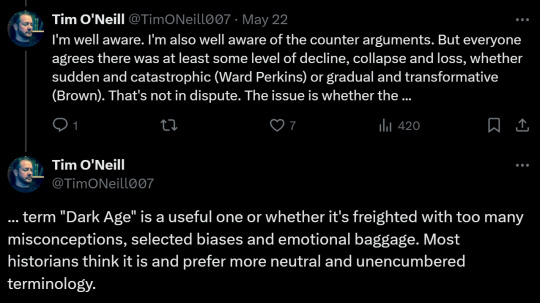
he basically acknowledges that there was a decline by several metrics -- even says this isn't disputed -- but then he still insists we stop using the term "dark age" because of "emotional baggage". lmao.
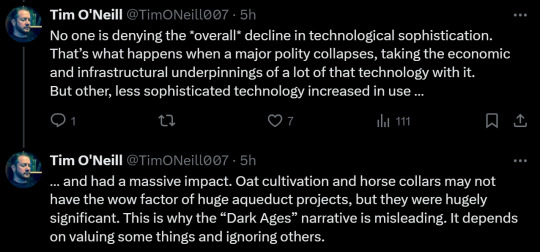
has the same energy as this:

#i think most of these people are just “medievalists” who are insecure#or they are just offended that their favorite time period has a negative association#i say: get over it#lmao#i am an amateur historian and i love the dark ages and i'm not going to stop using the term#if other people have misconceptions then boo hoo? that's not my problem#the people who matter will eventually do their own research and find out about the misconceptions#i just really hate this trend toward appealing to the lowest common denominator -- to the masses#gotta make sure everything is neutral and “unbiased” and unoffensive#BORING#why you gotta make everything sterile#i can tell you: because they want to replace it with something else#renaming/redefining things is basically the equivalent of#a conqueror destroying the temples and monuments of a people he conquered#to clear the way for him to impose his own values/ideology#it's never innocent though they try to dress it up as such#i also wonder about these people's conception of history#do they just think history is linear/progressive?#where things are just always the same or better and never getting worse?#if not then what is the harm in acknowledging that sometimes things get worse?
1 note
·
View note
Text
agree in general with the post about character design but Genshin Impact is not just "avoiding friction" with its samey thin character designs but rather is also constrained by its medium and materials cost.
the characters in dungeon meshi don't have to move*, so they can have more distinct facial features, body types, etc. that would normally require much more effort to animate in a dynamic gameplay environment. the moment your guys start moving, especially in 3d environments, flat colors and simple shapes take the day:
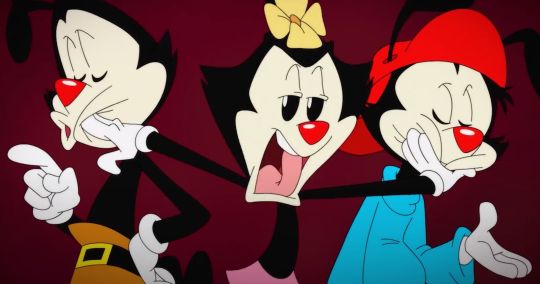
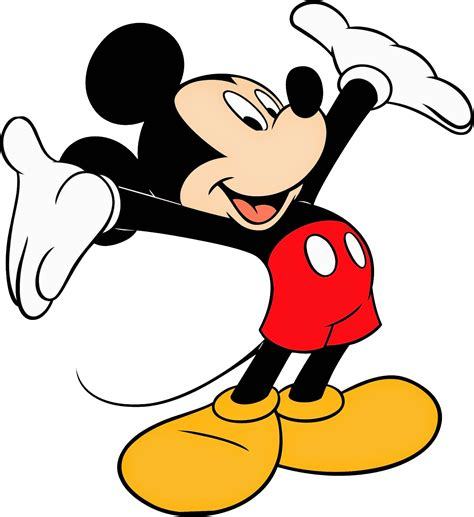
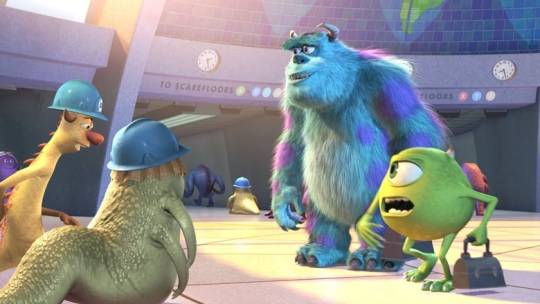
*"but dungeon meshi has an anime!" - yeah, more on that later
now obviously, this still allows you diversity in body type (I mean I literally put Monsters, Inc. in this example, just look at Sully, the big blue guy,) but the closer you get to human the less creative liberties you are going to get to take with physics and anatomy.
The Incredibles isn't just a landmark film because Brad Bird managed to sneak an Ayn Rand novel into a 1 hour, 55 minute runtime, but because the art team managed a distinctive cast of human characters who aren't uncanny valley monsters, which was a first for Pixar. I don't think it's a coincidence that the most dynamic action scenes still feature the characters' limbs in largely flat, one-or-two tone uniforms:

(Note that they still kinda cheated by making everyone a tubular homunculus. The Incredibles is a damn good looking film but it's also a good example of how style lets you get away with a lot.)
Even Dungeon Meshi's own anime favors a cleaner, flatter style to accommodate motion (although note that it's still fucking gorgeous and I think most would agree it still captures the spirit of Ryoko Kui's work):

add in that 3d environments with free movement are inherently more complex, and a desire to reuse assets as much as humanly possible to save effort (because sadly artists in games are still treated as loss leaders) and it's no surprise that Genshin Impact has the same 3 body types and faces with different pieces on them
I actually think it's very rare that most commercial character artists are avoiding character design diversity out of fear but rather due to the unreasonable constraints on their work.
My proof? Hoyoverse, the creators of Genshin Impact, wouldn't have given Ben Bigger a bespoke model in ZZZ if there wasn't a character artist in there who wanted more than the bare minimum mass appeal designs:

My takeaway here is not that we should let lowest common denominator design teams get away with a lack of character diversity scot-free, but that we also have to systemically understand the material conditions and medium constraints the works are made under. el problema es el capitalsmo and all that. (assuming you agree with me that it's a flaw, anyway)
18 notes
·
View notes
Text
it has been brought to my attention that whenever I have a problem in my personal life I tend to make too many connections and blow it up into a problem with society so take this post with a grain of salt. but I think a big problem with society today is we don’t have a sense of fun anymore, like, as a culture. we don’t have art we have mass produced corporate shit appealing to the lowest common denominator. we don’t strive for beauty, everything is just grey. we’re all supposed to look the same, act the same, follow the same general life path until we die. we’re supposed to follow all the rules and be good but never ever ever like anything too much or feel real passion. kids don’t even play anymore and most adults have 100% lost their sense of fun and whimsy. everything is practical, nothing is ritualized. in many cases having fun is either illegal or expensive. everything requires paperwork. I don’t think anyone is supposed to live like this, and I for one never will.
7 notes
·
View notes
Text
I'm so tired of this "baby-proofing" of the internet and pop culture. And no, I don't consider warning for sensitive topics/words to be baby-proofing.
(Warning: Mentions of common trigger words below.)
Can't say words like death or sex or suicide-- can't say swear words-- can't post even tasteful nudity or sexual content, much less all your niche fetishistic things-- without worrying about the banhammer or being censored or having your content removed. And yet, we do need content moderation-- within reason. A balance needs to be struck between legitimately harmful content and everything else.
There is no easy answer to this. Bots do not solve the problem of weeding out things that are uploaded with ill/harmful/illegal intent and there are horror stories out there (feel free to look up what human filters go through on YouTube) of actual people gettiing rapidly burned out because of having to weed out the millions of GB of absolute shit being dumped online every hour. This is nothing to say of content that helps spread inflammatory rhetoric and misinformation but is not outright graphic--and where the line on that is drawn varies from person to person. A robot cannot make a call on all these perfectly and neither can a team of people due to the sheer volume.
The last ten years, I've seen this spread into online culture where people are increasingly unable, unequipped, unwilling (or all of the above) to address more tough/sensitive topics in a productive manner.
What it comes down to, in my opinion, is corporatization of western culture (speaking for the hemisphere I live in and am most familiar with). The "corporatization" of culture has been going on for a long, long time, it's true. But at least for a time, the internet was a "wild west", a pocket of culture and subcultures that wasn't monetized, commodified, sanitized, and whitewashed for mass marketing appeal--it's easier to reach the widest audience if your content is bland enough to be palettable to the lowest common denominator.
It's been upsetting, to say the least, to watch the rapid sandblasting of so many things I love--including, but not limited to: Video games, social media, online spaces in general.
The only way I can think to effectively fight this can be summed up in one word: Education.
Read books. Take free/cheap courses on media literacy from reputable sources. Look up effective ways to communicate with other people. Learn how to debate and present arguments and how to listen, in turn. Try to learn how to stop yourself when you're getting emotional about anything and ask yourself: Why am I upset about this? What will flying off the handle do? Am I justified in speaking out? If I'm justified, is this really the time/place to speak out? Learn how to hold your tongue--not because of other people but to protect yourself and your mental health from overextending and from bringing eyes on you when you aren't ready for those consequences. Learn to read and speak in good faith.
All of these things take consistent practice. Culture can't be changed overnight and neither can you, but how those changes start to stick is by all of us practicing and changing over time.
We don't need to put up with the sanitization of our world by people who will be dead in a few decades. Gen Z and Millennials and even Gen X have already had so much stolen from us; I don't want to see them take it all. We have to build our own world brick by brick in the crumbling remnants of the past and that vibrant and good place starts with educating ourselves and each other.
15 notes
·
View notes
Text

Whoever is behind these 2 blogs and other gimmick blogs of their ilk have my full, undying wrath. You are not funny. You will never be funny. You serve as a content aggregator, a living "for you" page for the masses, a machination appealing to the lowest common denominator. That's all you are. Pointless comments that force me to take the extra 5 seconds to find the last reblog without them, the blood boiling behind my eyes and frothing at the mouth like a rabid animal
To log on every day just to contribute nothing of value, just benign mediocrity, must leave a gaping hole in your soul. It's poison, but it's so harmless that it would give you a bit of a tummyache instead of killing you. Something put into food to taint it not beyond recognition but just enough to make you wonder what is causing it to taste like shit
But anyway, I'd say this is going pretty well for a first date, wouldn't you agree ?
2 notes
·
View notes
Text
There's a @staff post going around talking about "Product Strategy" and yes, we love that Tumblr Staff continues to be transparent about their ideas with the user base, but lemme tell you it smacks of the verbiage a service/platform/company uses when they're about to launch an initiative which will end with them going tits up.
Essentially the strategy boils down to "How do we convert Tumblr viewers to new users?" and "How do we make Tumblr easier to use?" To the average looker, these two questions seem harmless and even beneficial for the purpose of growing Tumblr and making it a better platform. However the doomers and long-time users read this as "How do we help the horde from Twitter adapt and give them an experience familiar to the Big Blue Bird?"
I won't expand further on the strategy because it would take forever, but you can read the staff post for yourself. Tumblr doesn't need to do much to improve this platform; it's worked because it's essentially everything Twitter/Facebook aren't. They could improve the post editor, which for writers or long-posters would make the content creation experience less clunky. They could loosen the limits on what's considered "adult content." They could build their staff and create tools and resources for new Tumblr users to learn how to best use the site.
They don't need an algorithm. They don't need to appeal to the masses coming over from Twitter. In fact, this horde will probably go crawling back to Twitter or use Threads like fools. Then all the changes will have been in vain. Tumblr has survived (for better or worse) because it's been the weird blue sheep of social media for well over a decade. Any attempt to make it mainstream has either had only modest success (brand and celebrity tie-ins) or failed miserably (selling out to Yahoo and Verizon, and - although I know it wasn't officially sanctioned by the company - Dashcon.)
Tumblr has never needed to appeal to the lowest common denominator. Why start now?
2 notes
·
View notes
Text
I do think it matters if people's only intake of music is TikTok. Not because it's uncool, or even because it has a "negative" effect on the form and sound of music because while I personally dislike the shorter form with fewer verses and parts, the 3-ish minute format of the pop single is just a remnant from the technical limitations of early music recordings. Recording tech and delivery platforms is always always always going to make a mark on pop music. The medium is the message.
It's not even that people aren't actively seeking out music because most people NEVER did that. Most people have always just sort of listened to what's on the radio or what's happening in their local scene and hung on to what appealed to them. Even if you're a Cool Music Fan your taste is probably curated for you by, like, Anthony Fantano or Pitchfork or whatever friend you have who trawls through bandcamp.
That all being said - the difference here is that algorithmic music curation seems to smooth off all the sharp edges. Mass media has always worked to appeal to the lowest common denominator but when a human is curating that they're likely to still slip through something that's just their personal taste. Roxette famously only got their break internationally because a superfan pestered his local label about them. How many bands haven't lived or died by enthusiastic radio DJs slipping their demos or under the radar singles in between the hits? Bohemian Rhapsody was a gamble of a single at the time and it paid off because the band had the credibility and enthusiasm to push it (and because it's a baller tune).
Now I don't think people are going to stop listening to music in clubs and pubs, in movies or from reviews, in favour of getting it all from this one social media platform. That said I do think that there's reason to be concerned if a large chunk of popular music is entirely optimised for maximum engagement in a minimal amount of runtime with a minimized impact from individual human biases. But please prove me wrong, I don't know enough about TikTok to actually make a definitive statement on any of this, lol.
3 notes
·
View notes
Text
also i think one of the biggest problems with the later fate entries is how they focus on the servants rather than the masters
if you look at the og fsn the only servants who really had any true characterization were saber, archer, and rider. the other servants had their times to shine, but they weren't really the focus. it was about the human characters and their journeys. note that fate is the only route where there's a servant vs. servant final battle (saber vs rider is the second to last fight in heaven's feel, and in fact in ubw the last servant vs servant fight is... saber and assassin, which is rather short and sweet), and even then saber vs. gilgamesh shares the spotlight with shirou vs. kotomine. i think the thing is, cool servant fights appeal to the lowest common denominator (note that i'm not saying i hate those fights, because they are awesome), and the later entries super play into the "smashing action figures together" appeal of that, but it's also how you get shit like apocrypha where the human characters don't matter at all, or fgo which is just blatantly about how cool and marketable the servants are. it's basically turned fate into a mon series of sorts if that makes sense.
kinda lost steam here as usual but basically i think a lot of the annoying things about the later fate series is related to how the series has played into the least common denominator aspects of it for mass appeal.
3 notes
·
View notes
Text
People are so eager to blame every dumb lowest-common-denominator-appeal aspect of every kind of mass-market media on China. From big dumb action scenes in superhero movies to boringly attractive character design in video games to shallow and poorly-constructed themes in everything, I've seen it all blamed on China. (Also homophobia in Disney products, and other Bad Politics.)
It's like these people think Americans are all/mostly classy liberal intellectuals who like High Art, while the Chinese are almost/universally lowbrow hicks who just like boobs or explosions or whatever.
That's Sinophobia! Or possibly American exceptionalism? Dumb either way.
whenever a liberal blames disney homophobia on china I blow up another AO3 datacentre
14K notes
·
View notes
Text
thinking about the rise in ai ‘art’ in relation to my job is a strange feeling.
i ghostwrite for a publishing company. i write books that get published on amazon as e-books with pen names. i know the pen names used by this specific company, and they each have hundreds of books attributed to them, like you look at this for five minutes and it becomes obvious that none of these people are real because no one can churn out an ~80k book every week.
and it’s a little annoying because the demographic the company works towards is (straight) young adult men, so it’s a lot of big-breasted women who think Main Character Man is the best thing ever, some elements of the power fantasy are a little cringe and eye-rolling, a lot of the sex is very cringe and eye-rolling, but it’s also a really fun job. i get to think up plots that are a bit goofy and a bit over-the-top and i write those books and they get read and reviewed and i get paid to write them.
there is a lot wrong with this way of writing, of treating a book like something to be churned out on a tight schedule with little-to-no chance for revision and refinement. if i had full creative control, i would change a lot about the series i am currently writing, even though i created it and i do have a decent amount of creative control already! it’s far from perfect, but i’m also just starting out in this sector and the pay is pretty decent. i’m lucky to even be working in a job in my desired sector.
but the key thing for me is, i’m employed. i’m being paid to write this stuff because even though i’m on a tight schedule that means my first idea is generally what gets done, that i don’t have a chance to let things mull over and get really good, that i’m required to include X and Y and Z to appeal to this very specific demographic i’m writing for, i am in a job i like in the industry i want to work in. a creative industry no less, in a company that, on the outside, would seem like it would jump at the chance to fully automate the process and just shove in some prompts to a text generator and get a full-length book in a fraction of the time without having to pay writers and editors. but they haven’t. even the company i’m working at, which does treat books as very commercial, need-to-be-churned-out-quick-to-make-a-profit piece of content to be consumed, they’re not using ai. they understand human creativity, even on this compressed schedule, is incomparable, and irreplicable.
so i am very confident ai will die. the death might be slow, but it will be embarrassing. and hopefully, people will realise why using ai generators is bad. it’s not just stealing from real creatives (because how else do they train the algorithms without masses of pre-existing data) but because it lacks creativity. all an ai can do is predict, based off a prompt, where something is most likely to go, which word is most likely to come next. you get the lowest common denominator of any potential creative output. and even when my work is rushed, when i can’t let ideas sit for weeks, months, or even longer, i know it’s far, far better than that. and so is every writer’s. so is every artist’s.
1 note
·
View note
Text
Lately I really like going on Discogs and examining all of the album art across the years for whatever musical artist my brain reminds myself of. It’s a fascinating journey, going through the evolution (sometimes devolution) of an artist’s publicly purchasable portrayal (there’s Power in that). The Disney pop stars going from clandestine pop to clandestine pop that happens to have somewhat Blink 182 adjacent guitar and some skinshowing. The punkers who somehow kept on truckin’ into the digital age and their beautifully clunky transitions from cut-and-paste analog collage to top-tier digital vomit. And all the bands where it’s obvious that the deal they struck with their label sold away their license to have an album cover that isn’t genetically engineered to appeal to whatever hip graphix trends are sweeping the nation. From nineties wannabe grunge intentionally-shit photography and questionable font choices to double-0’s vector awesomeness to pseudo-vaporwave hipsterdom for the early tens, maybe an awful eyesore 80s Memphis throwback to show how quirky you are. Nowadays, it’s…well, I’m not quite sure what the dominant style is nowadays. Anachronism? In politics, it’s surely anachronism.
Image is all over the news lately. I mentioned The Wall earlier, and now I’m Germany they’re trying to “probe” Roger Waters for doing the same fascist satire that Pink Floyd’s been doing since the seventies. He’s 79—you’re never too old to have the official Twitter account for ISRAEL call you out because they didn’t like that you called out their awful occupation on your video screen. I don’t agree with everything Roger says; you can’t agree with EVERYTHING someone famous says. (Too many people make the mistake of forgetting this.) But his dedication to calling out that authority is pretty inspiring. Sometimes, being a cranky old man with production values can lead to some good in the world. Respect.
I’m still reeling of that rewatch of The Wall, so much so that I watched it again. I felt like I had to to provide some closure and healing for my hammer-traumatized brain. But it was a numb watch. I was itching for more, more than just consumption, even if it was active. Two-ish weeks ago, rewatching Bob Geldof strut his stuff with no eyebrows and leather boots made me know that I couldn’t just sit idle while stupidity continues to be prescribed to insufferable teenagers and close minded geriatrics alike. While the lowest common denominator continues to be served on a golden platter to the masses. While I’m supposed to care about who’s dating who and who’s having a baby. While politicians and companies regurgitate and pander to humanity’s most base, primal impulses. While dehumanization and stereotype drive sales of dumpster-ready sweatshop shirts emblazoned with empty messages of empowerment and printed denim, and sales are going up, up, up. I was scared. Scared for my agency as a freethinking young woman.
Nothing that $200 worth of FL Studio can’t fix.
0 notes
Text
hi do you know the rage that helvetica and its evangelists evoke in me?? like fuck its not about helvetica helvetica - actual rage towards any font (yes even that one) is just a low effort meme: youre not funny. but as its cleanliness and uniformity has grown into modern design ethos like a cancer it has been chosen as the de-facto correct answer to any design problem. i thought that graphic design was the art of communication? did we not take the same classes?? yalls professors forget to tell you this????
i cant divine the exact reasons why this has happened. i have guesses and conspiracy theories but nothing useful. internally ive been calling it the "apple store problem" where good minimalism is really hard - nearly impossible to make human enough, but bad minimalism is hilariously easy. yes im a frank lloyd wright hater why do you ask. but all of these individual examples are just data points and i am stuck inside my mind with no identifiable root cause.
furthermore, and perhaps more important: - is it fair to critique an art movement on the basis of its incurious hacks? - doesnt every artist in every era feel like this? - isnt this just the feeling of having an Establishment against which we make our art? - isnt it okay that corporate art is always going to be "like that"? that all corporate art is always going to trend towards least common denominator, watered-down mass-appeal? - how careful do i have to be? when i sit here and complain that advertising of all things is more and more stale oatmeal how much am i yearning for a mythical perfect past where REAL artists made REAL art and not this degenerate* slop? - is it even worth it to try and ask that art in advertising be any good? like. its still art for advertising. yknow. the horrifying screeching mindless presence of light and sound that exists only to wring every living drop of attention, time, energy, and capitol out of humans until we are a barely living, shivering, bio-mechanical GDP booster whos only purpose is to feed the machine that hurts us. that advertising.
i think maybe theres more here than: clean lines bad and im bored
oh hi there, i see you making *word associations. yes, that is exactly what i was talking about, thansk for noticing: OG fascists and neo fascists love to cite how great art used to be before The Bad Times as a way to retroactively legitimize themselves and to propose a Good future where they win verses the Bad future where cops arent allowed to murder people. this regularly seeps like poison into conversations about mass-market art because they both sound like criticisms of the present. in discussions on the damaging relationship between art and commerce where most folks there are lamenting how the need to be advertiser friendly stunts communication and limits what art can even be made, you can regularly find little fascist shits whinging about the good ol days. when complaining about how capitalism is making it impossible to talk about sex or being black or being trans in your art make sure youre not inventing fictional pasts. there was never a The Good Times where only real artists prevailed. yes we are in a particularly censor-heavy, advertiser-friendliness-driven time on the internet BUT getting sucked into the rhetoric of how much society has devolved these days lands you in Neo Nazi Proximity Danger Zone.
where was i? oh yah: 1. charles eames can get fucked. 2. it is a good thing to demand more from the commercial art in your life 3. if youre bored of the same thing again and again try finding independent art projects that match your freak and come back to me 4. the achingly personal, earnest art you make will never be lowest common denominator marketable 5. do it anyways. make bad art that pisses people off. 6. i also hate helvetica for reasons that have nothing to do with this rant, its just not appealing to me. i like Baskerville and MCIR fonts




#images#sheep speaks#make bad art that pisses people off#long post#holy shit this went longer than expected
8K notes
·
View notes
Text
Mass Culture
Mass culture refers to standardised, formulaic, mass produced cultural products designed to be entertaining and simplistic so that it will be consumed by a mass audience. Mass culture is produced by companies in order to make a profit and is deliberately designed to be simplistic so that it appeals to the lowest common denominator. Examples of mass culture include any mass produced cultural…

View On WordPress
1 note
·
View note
Text
very popular art is necessarily very shallow: as each person has their own sense of disgust and personal distastes which a work in pursuit of mass appeal must avoid, and in doing so constrain itself to the bland and the banal
and likewise for longevity: a piece of art whose appeal is so universal as to span generations and survive cultural shifts, is, in other words, a piece of lowest common denominator garbage
176 notes
·
View notes
Note
It’s obv not as important as other terrible things the writers have done, but the way we barely see the greens’ dragons and the bond with their riders is just… not shown?
we don’t get vhagar roaring as aemond was in pain (there’s the “he stole vhagar” claim though that not one character corrected), but we get a scene of syrax sensing rhaenyra’s pain. we don’t get aegon riding sunfyre after his coronation, but we get rhaenyra riding syrax, and meleys almost burning the greens. sunfyre isn’t only the most beautiful dragon that george himself was looking forward to seeing, but also his bond with aegon was special and far superior and it’s just not there. obviously daeron is entirely absent, and we got a tiny look at dreamfyre. not anywhere near helaena though.
it’s a lot of things like this that make it obvious the show is about the blacks and for team black.
I think the show writers are trying to have their cake and eat it too. They want the "prestige" of having a complex narrative with morally grey characters, but they also want to cater to the lowest common denominator and have a story with clear good guys and bad guys to give the show mass appeal and huge ratings. They couldn't make up their minds as a collective team of writers, and that's why we got this contradictory mess.
They want to pat themselves on the back for making the Team Green characters more complex and deep than how GRRM originally wrote them, but they also can't give Team Green too much of their canon cool moments, or else there won't be a "team" for the audience to root for and the show's ratings wouldn't be as huge.
10 notes
·
View notes